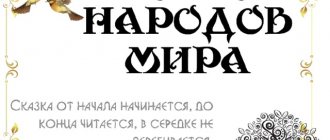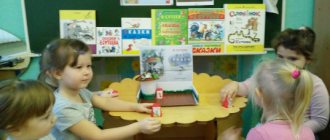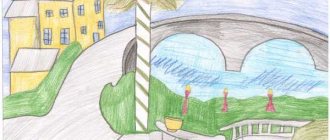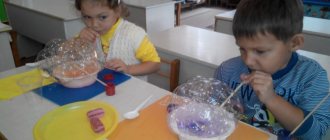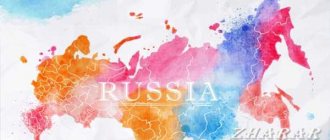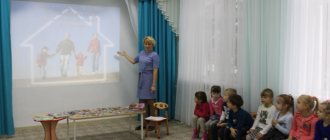Long-term project at the preschool educational institution “Where the Motherland Begins”
- February 12, 2014
Conference “Project activity in an educational institution - 2014”
Nomination “Pedagogical project in a preschool institution”
“Love for your native land, native culture, native speech begins small - with love for your family, for your home, for your kindergarten. Gradually expanding, this love turns into love for the Motherland, its history, past and present, for all humanity.” D. S. Likhachev
My goal was to educate a humane, spiritual and moral personality, worthy future citizens of Russia, patriots of their Fatherland. Through a patriotic feeling, to educate an individual, a citizen of his country. Formation of spiritual and moral attitudes and a sense of belonging to the family, city, country, and nature of the native land.
All work was planned and divided into the following topics:
“My family”: To foster a culture of behavior, the principles of humanism, humane relations between children and adults (following the basic rules of community life, goodwill, responsiveness, caring attitude towards loved ones, etc.); education of collectivism, the formation of collectivistic relationships among children.
“ My city, region and region in which I live ”: Raising in a child love and affection for his home, the land where he was born, based on familiarization with his native nature, culture and traditions. Fostering patriotism, respect for the past and present of the Urals and Kirovgrad.
“ Russia is my Motherland! ": To instill in children a love for the large, multinational Motherland - Russia, to bring them to an understanding: to love the Motherland means to know its history, culture, people
“ The Earth is our common home ”: To cultivate in children a love for the nature of the Earth, a desire to preserve and protect it. Teach to live in peace with yourself and other people in harmony and unity with nature.
The project was long and complex. Children know what the Motherland and Russia, the Urals, their native land are. They completed the tasks assigned to them, learned a lot of new things, and consolidated their previously acquired knowledge. The parents were satisfied with the work done.
I believe that my children will love and protect their loved ones, be proud of their country, region and city, will be patriots of the Fatherland, its defenders. The sprouts of a spiritual and moral attitude and a sense of belonging to one’s hometown, to Russia, to the nature of one’s native land, to the cultural heritage of one’s people, sown in kindergarten, will grow into a great and wonderful sense of patriotism, responsiveness, sympathy, kindness, joy for others, feelings encouraging action: to help, show care, attention, reassure, please. And I am proud that these children are my students.
In the photo: I am with the children in the city park. Love for one's native land begins with love for nature.
Presentation Where the Motherland Begins
Long-term project Where does the Motherland begin?
Author: Shavrina Lyubov Nikolaevna, teacher of the first qualification category of MADOU kindergarten No. 3 “Firefly”, city of Kirovgrad, Sverdlovsk region. Pedagogical work experience is 15 years, work experience as a teacher is 15 years. Finalist of the professional pedagogical excellence competition “Educate a Person”.
Consultation for parents “Where does the Motherland begin?”
Consultation for parents
“Where does the Motherland begin?”
Prepared by:
teacher at MADOU "Kindergarten No. 23"
Ismagilova E.V.
2019
Description of material:
The methodological development of the consultation will tell parents of preschoolers how to cultivate a sense of love and pride for Russia, interest in social events of their hometown and our country, and respect for work. The information will help parents in developing patriotic feelings in preschool children. The presented material will be interesting and useful to parents; teachers, educators, methodologists of preschool educational institutions. The information can be used at parent-teacher meetings or filed in folders in the premises of the preschool educational institution.
Purpose of the material:
consultation for parents of preschool children.
Target:
systematization of parents' knowledge on patriotic education of preschool children.
Tasks:
— to promote the strengthening of interaction between the teaching staff of the preschool educational institution and the family; — improve work with parents on the patriotic education of preschool children; — to arouse in parents a desire to develop and deepen patriotic feelings in preschool children.
Dear parents!
Educational tasks
determine
the need to familiarize preschoolers with the surrounding reality
: with the city or any other locality in which the family lives and the child’s second home is located - a kindergarten;
with the capital of our Motherland - Moscow. Children should know their city and love it as an integral part of the Motherland. Parents can systematically and gradually (in small doses) expand their children’s understanding of the features of the city, forming a variety of experiences associated with their native places. The city for a small child begins with his home and is limited by the nearest space. Home is both close people and concrete things, something that is perceived directly. An address is already a generalized concept that includes everything specific that characterizes a house. An address is both a house number and a street with its name. The address begins the departure from the concrete and the formation of the concepts of “street” and “city”. After children and their parents walk along their street, and then along others, they begin to understand that the city includes many streets. The adult names the streets, explains the name, giving them a kind of specificity. Parents can connect older children's excursions around the city with stories about the people living in this city and their work. Gradually, based on facts, children begin to better understand the social nature of people’s work
and the importance of the products of specific industries for the whole country. Having mastered the general concept of “city” (or “town”, “village”), children, by analogy, imagine other cities (other settlements). They themselves will say: “There are many cities in Russia.”
This understanding allows parents to talk about the main city of our country
—
Moscow
, tell about the Kremlin, on the towers of which ruby stars are burning, about the Mausoleum and Red Square, about the Moscow metro, about beautiful buildings and parks.
The adult tells the children that the main institutions of the country are located in Moscow. She is loved and all the peoples of our country are proud of her. And children from an early age need to be taught respect for the capital
.
In order to cultivate love and respect for the capital, the use of various visual and figurative means is effective. Preschool children can be invited to go on a journey with book characters. The image of the hero of any work is usually close to children, because it is always a child. A joint journey with the hero gives an active character to perception, deepens interest, activates the processes of thinking and speech, and affects the feelings of children. The point is not to use any specific story, but to use the method of including a character close to children into the plot of the story when telling about something big and serious. Here are some books that can be read to preschoolers: Petrova O. “My Moscow” (2012); Deryagina L. “My Motherland Russia” (2007). It is good to accompany reading by viewing illustrations and paintings. Words and visual images make perception more complete, leave a deep imprint in the memory and experiences of children, what they see and hear is realized and reproduced in children’s stories and drawings.
The lives of children are connected with Moscow, as well as with their hometown. Parents can repeatedly and at different times of the year show their children Red Square and the holidays taking place there. Children are attracted by the colorfulness, brightness, multi-colored balloons, flowers, posters, the solemnity of processions, etc. All this evokes a feeling of joy and love for the Motherland. In television programs and films, the majesty of Moscow streets, the vastness of squares, the beauty of theaters and metro halls are revealed to children. And it’s very good if parents, “traveling” with their children around Moscow, draw their attention to the work of Muscovites
, for their
hospitality
.
Through something that is accessible to children and arouses their interest, an adult forms an attitude towards Moscow as the capital of the Motherland
. The question may arise where to start: by expanding knowledge about Moscow or about the city, village, village where children live. There cannot be any obligatory sequence here: something that is geographically farther away can also be close, but it is expensive in terms of content, in terms of the children’s experiences, and sometimes what is close is better seen through what is distant. Therefore, parents themselves can determine the sequence of imparting knowledge to their children.
From an early age, children should know that Russia is a multinational state
that all peoples of our country are equal. They help each other in their work, together they defend our state from enemies and fight for world peace. To make this knowledge accessible, we need to start with what is close to the lives of the children themselves. Children enjoy listening to fairy tales of different nations, melodies of songs, and learning dances. Illustrations with objects of applied art not only help visually perceive and assimilate the characteristic features of the work and life of a particular people, but also expand the interests of children and deepen feelings of sympathy for the peoples of different nationalities.
Each state has its own coat of arms
.
It is necessary to show children the Coat of Arms of Russia, and tell older preschoolers about the state symbol of the Russian Federation. Then you should draw attention to the coat of arms of your republic and other republics. The state symbol of the Russian Federation is also the flag
.
On national holidays, children see flags on buildings and houses. From a very early age, it is necessary to instill
in children respect for the national flag and clearly explain to them what the colors of the flag mean.
Children should also be introduced to the melody anthem
and told that when the anthem sounds, all people stand up and listen to it in silence.
Respect for the state symbols of Russia should be one of the foundations of instilling love for the Motherland, moral and mental education in unity.

